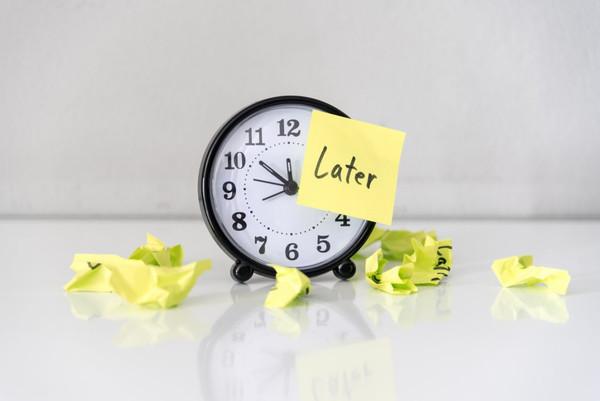Why We Procrastinate
Curated from: psychologytoday.com
Ideas, facts & insights covering these topics:
10 ideas
·284K reads
853
23
Explore the World's Best Ideas
Join today and uncover 100+ curated journeys from 50+ topics. Unlock access to our mobile app with extensive features.
Procrastination is a lifestyle
20% of people identify themselves as chronic procrastinators. For them, procrastination is a lifestyle, albeit a maladaptive one.
It cuts across all domains of their lives. They don't pay bills on time. They miss opportunities for buying tickets to concerts.
3K
42K reads
Not taking procrastination seriously
Procrastination represents a profound problem of self-regulation.
There may be more of it in the U.S. than in other countries because we are so nice; we don't call people on their excuses ("my grandmother died last week") even when we don't believe them.
2.65K
33.5K reads
Not a planning problem
Procrastinators are not different in their ability to estimate time, although they are more optimistic than others.
Telling someone who procrastinates to buy a weekly planner is like telling someone with chronic depression to just cheer up.
3.03K
31.1K reads
Procrastinators are made, not born
It is one response to an authoritarian parenting style. Having a harsh, controlling father keeps children from developing the ability to regulate themselves.
3.37K
31K reads
Procrastinators drink more
It is a manifestation of generalized problems in self-regulation. That is over and above the effect of avoidant coping styles that underlie procrastination and lead to disengagement via substance abuse.
2.74K
27.3K reads
Lies procrastinators tell
- "I'll feel more like doing this tomorrow." Or "I work best under pressure." They do not get the urge the next day or work best under pressure.
- Another big lie is that time pressure makes them more creative. Unfortunately, they do not turn out to be more creative; they only feel that way.
They squander their resources avoiding.
3.4K
25.3K reads
Looking for distractions
Procrastinators actively look for distractions, particularly ones that don't take a lot of commitment on their part.
Checking e-mail is almost perfect for this purpose. They distract themselves as a way of regulating their emotions such as fear of failure.
3.37K
24.4K reads
Types of procrastinators
- Arousal types, or thrill-seekers, who wait until the last minute for the euphoric rush.
- Avoiders, who may be avoiding the fear of failure or even fear of success; they would rather have others think they lack effort than ability.
- Decisional procrastinators, who cannot make a decision. Not making a decision absolves procrastinators of responsibility for the outcome of events.
4.05K
23.6K reads
Procrastination costs you
- Health. Just over the course of a single academic term, procrastinating college students had such evidence of compromised immune systems as more colds and flu, more gastrointestinal problems. And they had insomnia.
- Procrastination has a high cost to others as well as oneself; it shifts the burden of responsibilities onto others, who become resentful. Procrastination destroys teamwork in the workplace and private relationships.
3.23K
20.7K reads
Changing behaviors
Procrastinators can change their behavior. It doesn't necessarily mean one feels transformed internally. It can be done with highly structured cognitive-behavioral therapy.
3K
24.7K reads
IDEAS CURATED BY
Ethan O.'s ideas are part of this journey:
Learn more about timemanagement with this collection
How to create a productive environment
The importance of self-care in productivity
How to avoid distractions
Related collections
Similar ideas
3 ideas
11 ideas
Cartoon Guide of Why Procrastinators Procrastinate
waitbutwhy.com
11 ideas
This Is What’s Going On In Our Brain When We Procrastinate
fastcompany.com
Read & Learn
20x Faster
without
deepstash
with
deepstash
with
deepstash
Personalized microlearning
—
100+ Learning Journeys
—
Access to 200,000+ ideas
—
Access to the mobile app
—
Unlimited idea saving
—
—
Unlimited history
—
—
Unlimited listening to ideas
—
—
Downloading & offline access
—
—
Supercharge your mind with one idea per day
Enter your email and spend 1 minute every day to learn something new.
I agree to receive email updates
